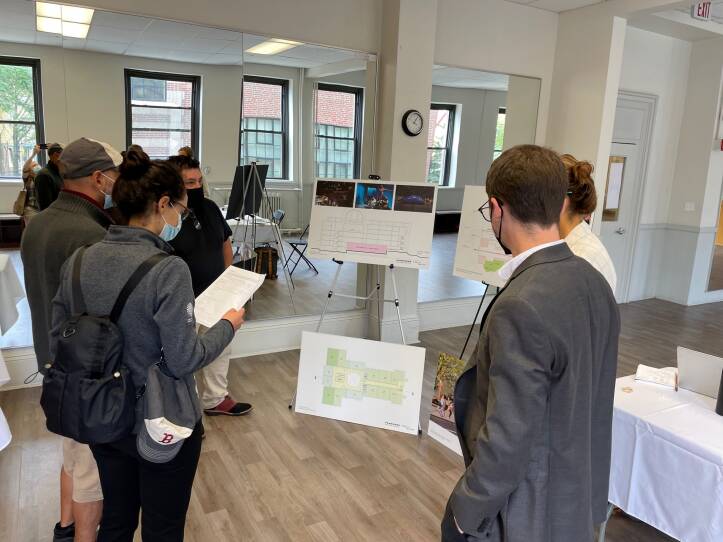Jamaica Plain community members are weighing in on the future of a massive, 20,000-square foot church in Boston’s only designated Latin Quarter, which residents, activists and former parishioners worry could obliterate the cultural fabric of the neighborhood if made into high-cost housing.
Local nonprofit Hyde Square Task Force, which owns the former Church of the Blessed Sacrament, began a public process Saturday to allow residents to help choose among three competing multi-million dollar redevelopment options.
Pennrose, NuVu Studio and Alvarado & Beaujean presented residents with their proposals at the first of several public meetings that began on Saturday. They offered two competing housing proposals with performance spaces, and a third plan to open a private high school in the building.
Community members worried for the past year that the building would be sold to developers without a public process, restrictions or guidelines on rent, historic preservation and community ties.
Pennrose pitched 52 rent- and income-restricted housing units, indoor and outdoor performance spaces and dozens of parking spaces. It is the only developer offering the Task Force an ownership stake in the project, to help run the shared community space.
Saeed Arida of NuVu proposed a private high school for 150 students with a studio-based learning model, echoing NuVu’s existing school in Cambridge’s Central Square.
Pablo Alvarado, an immigrant and 20-year Jamaica Plain resident, wants to create 46 housing units, practice rooms and a 210-seat performance space, with smaller apartments starting at $1,550 and two-bedroom units at $2,600. The community would have 46 days of free access to the performance space for 10 years.
Residents voiced concerns over affordability, saying that the Boston minimum standard of making 13% of new units affordable is too low in this case. They also worried the income level at the standard of “affordable” is set too high at 60% of the Boston-area median income.
Resident Kathy Brown said Pennrose needed “to do deeper affordability” and lower the standard from 60% to 30% of area median income. The firm’s associates committed to providing more units for less than 60% on the spot.

Alvarado told GBH News just meeting Boston’s rule of putting 13% of housing units at an affordable price point “wasn’t gonna fly with the community” and committed to 20% and 25%.
“Even though they’re going to go with affordable as within 60% — and that’s not the average income in this neighborhood — I can’t necessarily pay those prices,” resident Pat Feeley said when evaluating the housing proposals. The 51-year Jamaica Plain resident, whose father used to attend the Church of the Blessed Sacrament, said the 10-year limit on event space access by Alvarado’s firm wouldn’t work for residents who want to see the Latin Quarter thrive for decades to come, a future that would include affordable performance spaces.
Rep. Nika Elugardo lives nearby and called the 10-year restriction “disqualifying.” She attended the Open House and said she is leaning toward Pennrose’s proposal; the firm is transforming the former William Barton Rogers school in Hyde Park into New England’s first LGBTQ-friendly senior affordable housing development, which impressed her.
“It’s just the value that they have around centering the leadership of local people, and the people that will be using their space,” Elugardo said.
Affordability was also brought up as a concern with the private high school proposal; the annual tuition would be $40,000. Arida said most students at the company’s Cambridge school, NuVu Innovation Center, receive financial aid from private enterprises or attend school for free.
“I don’t want people just to focus on this number because on the school side, we want to try to get as many students as we can and diversify on full or partial scholarship,” he said after one listener gasped at the tuition total. The school, he said, would have a focus on connecting students with the community.
The Task Force’s board of directors will vote on the proposals in October after reviewing community feedback.
“It’s really the community that’s gonna help us make that decision,” Task Force Executive Director Celina Miranda told GBH News.
Community-centered tenets, she said, have “always been guiding our thinking,” even though restrictions were not originally included with the posting for sale. The Task Force said in June that it would create a public process after community pushback and is sharing an online survey .
It bought the building from the Jamaica Plain Neighborhood Development Corporation for $800,000 in 2014 with the goal of creating a youth center, but scrapped the plan after little response to a 2019 request for proposals. But the criteria set forth in the 2019 proposal are still in play, Miranda said.
“We’re looking at the benefit to community in the form of performance space,” Miranda said. “We’re also looking at the financial benefit to support the Task Force, specifically looking at capital to retire the debt that we currently have on the property. We’re looking at accessible outdoor community space, naming considerations and the overall feasibility of the project.”
Correction: A previous version of this story said that the Task Force purchased the building for $6 million in 2014. It was bought for $800,000.






